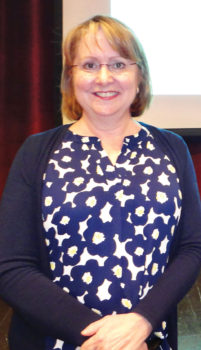
Gathering at the Brain Health seminar registration table

Audette Rackley, MS, UT Dallas Brain Health seminar
Marie Milleage
More than 100 residents attended the April 5, 2017 Brain Health Seminar introduced by resident Robert Toller and presented by Audette Rackley, expert in brain health research at the Brain Health Center, UT Dallas.
We joke about “senior moments” when we cannot remember a name or where something was placed. “Rather than worry about senior moments, it is more prudent to take action,” stated Ms. Rackley. Memory and thinking change as we age from decade to decade. Age is the most significant risk factor of a healthy brain followed by family history and genetics, but other risk factors can be modified, i.e., heart disease, high blood pressure, diabetes mellitus, pulmonary disease or obesity.
The brain is all-inclusive of areas controlling our psychological and physical functioning: physical activity, stress management, nutrition, cognitive training, sleep and social relationships. Giving consideration to incorporating strategies into a daily routine for each of these categories reduces the risk of mental decline. Talk with your doctor prior to developing a schedule of aerobic activity, muscle strengthening, balance, flexibility and resistance exercises. Address stress management by finding 10 mindful minutes daily to be kind, compassionate, grateful and joyous, and monitor your thoughts and feelings.
Challenge your body with information about the MIND Diet, a combination of specific foods in the DASH and Mediterranean diets that may lead to a healthier brain. U.S. News & Report described the MIND Diet as being favorable for a sharper brain. Or challenge your brain in new ways with cognitive training or brain exercises that require an activity that is “both novel and complex,” doing things that are new to you, making connections with different people or adopting a creative hobby.
Are you finding it difficult to fall asleep or obtain the suggested seven to eight hours of sleep nightly? Plan to make and stick to a schedule, develop a relaxing bedtime ritual: a warm bath, a cup of decaf tea, a comfortable mattress and pillow, a noiseless and dark room or something special to you. Avoid exercise, caffeine, nicotine and alcohol close to bedtime.
Social relationships have a bearing on our brains too. Practice listening and empathizing skills. At Robson Ranch it’s easy to get involved in the many activities and groups. Be sociable but avoid destructive and risky relationships.
Ms. Rackley advised, “You can take things one day at a time, changing your life in one and 10 minute chunks.” Do something new; start a mindfulness practice. Regarding our brain health, what we do matters.
DATCU credit union provided seminar refreshments and many door prizes.
All content within presentations sponsored by the Living Well Committee is intended for general information only. It should not be treated as a substitute for the medical advice of a professional health care provider. Neither the Living Well at Robson Ranch Committee, Robson Ranch Denton HOA, nor Robson Communities is responsible or liable for the content and do not endorse any commercial product or service mentioned or advised in any presentation.
